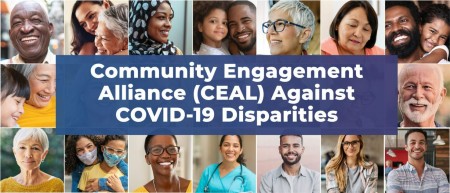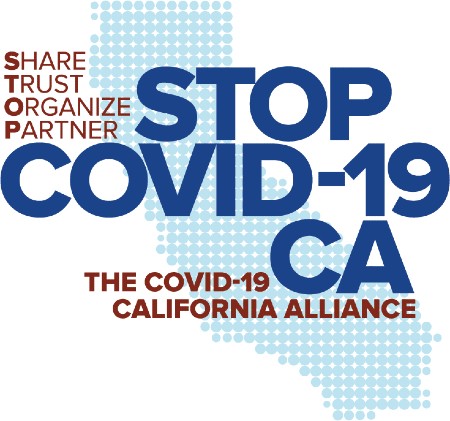Community Engagement Alliance (CEAL)
CEAL: The STOP COVID-19 CA Alliance
The STOP COVID-19 CA Alliance is a National Institutes of Health (NIH) funded California-wide, academic community partnership using community-engaged approaches to address COVID-19 prevention, treatment, and testing for those most at risk for COVID-19 infection and complications. The “STOP CA” stands for Share Trust Organize Partner California Alliance in the name of the project and “CEAL” stands for Community Engaged Alliance.
A group of five academic partners including UC Davis, Stanford, UC Merced, UC Irvine, and University of Southern California developed a free webinar workshop series, engaged an Advisory Board of Community Health Workers/Promortores and community partner organizations at each academic site in California to build capacity of Community Health Workers/Promotores (CHWs/Ps) and address mental health following the COVID-19 epidemic. Workshop webinar participants can earn a certificate by attending the webinar series and filling out the evaluations. The programs are presented in Spanish and English translation is available. All the programs are recorded in Spanish and English and available for later viewing on the Stanford Medicine Website.
The evidence-based, webinar workshops have been developed with key assistance from our Project Advisory Board made up of CHWs/Ps throughout the state of California ensuring that this program addresses important mental health needs and content.
Community Health Workers, also known as Promotores de Salud are a critical workforce well positioned to address inequities in medically underserved and hard to reach communities. CHWs/Ps are trusted and credible messengers who can disseminate health information including mental health and COVID-19 information and resources for the community.
Each one of the five academic partners is further collaborating with local community partners so the statewide webinar information and resources is further disseminated into the community. These partner organizations are participating with the Project Advisory Board, as well. UC Davis is proud to partner with two regional community partners, Heath Education Council and UC Western Center for Agricultural Health and Safety who are both leaders working with Community Health Workers/Promotores.
Workshop 1: ¡Me lleva la que me trajo! Mental Health and Wellbeing Among Latinas/os
Taller 1: ¡Me lleva la que me trajo! Salud y Bienestar en Latinas/os
Workshop 2: Trauma Mental Health: ¿what is it, how does it affect our communities, and how do we treat it?
Taller 2: Trauma y Salud Mental: ¿qué es, cómo afecta a nuestras comunidades, y cómo lo tratamos?
Workshop 3: Understanding and addressing depression, anxiety, and stress in our communities
Taller 3: Entendiendo y abordando la depresión, la ansiedad, y el estrés en nuestras comunidades
Workshop 4: Better to Prevent Than to Regret: Maintaining Mental Health and Well-being
Taller 4: Mejor prevenir que lamentar para mantener salud y bienestar mental
Workshop 5: Stress, Mental Health, and Mindfulness
Taller 5: Estrés, Salud Mental, y Mindfulness

Comprised of eleven academic institutions and their community partners, the goal is to understand factors that contribute to the disproportionate burden of COVID-19 in underserved communities and establish effective, community-engaged strategies to enhance education, awareness, access, and inclusion of underserved communities in research designed to advance the prevention and treatment of COVID-19 and reduce disease disparities.
UC Davis CEAL works with community partners to conduct outreach, training, and communication to reach farmworkers and other populations at greatest risk for COVID-19 across California with COVID-19 health and safety messages.
Working collaboratively with COVID partner projects like PANDEMIC, MOVE IT UP2 and Test-to-Treat, Digital Health Equity testing clinics, CEAL provides ongoing support with internal qualitative audience research, communication, messaging, and training for projects that provide service to vulnerable and hard to reach populations at greatest risk for COVID-19.
Background
People infected with SARS-CoV-2, the virus that causes COVID-19, may suffer from signs and symptoms that go beyond the common recovery period and the signs/symptoms may continue for several weeks, months, and sometimes years after their diagnosis. Other people feel as if they have recovered from COVID, returning to work and other life activities but experience a reoccurrence of COVID symptoms that are disabling in their ability to perform their daily life activities/routine. It is notable that Long COVID can affect individuals whether their initial infection was severe, mild, or asymptomatic. Near one third of COVID-19 patients who are not hospitalized have what is commonly called Long COVID.
Some common Long COVID symptoms are listed below.
- Breathing (respiratory symptoms)
- Heart and circulation (cardiovascular symptoms)
- Brain (neurological symptoms) sometimes described as Brain fog
- Digestive system (gastrointestinal symptoms)
- Joints and muscles (musculoskeletal symptoms)
- Mental health (psychological symptoms)
- Ear, nose, and throat symptoms
- Skin (dermatological symptoms)
- Fatigue (overall body symptom)
- Fever
- Pain
There are objective medical tests that can be conducted to support Long COVID complaints. For a patient who complains of “brain fog” or cognitive deficits, medical professionals can suggest neuropsychological testing. Neuropsychologists familiar with Long COVID and the signs/symptoms that commonly present in these cases are the most appropriate health professionals to make these types of diagnoses.
Serious long-term complications of COVID-19 have been noted to affect different organ systems in the body according to the Centers for Disease Control. These include the following list of complicating symptoms.
- Cardiovascular: inflammation of the heart muscle
- Respiratory: lung function abnormalities
- Renal: acute kidney injury
- Dermatologic: rash, hair loss
- Neurological: smell and taste problems, sleep issues, difficulty with concentration, memory problems
- Psychiatric: depression, anxiety, changes in mood
Medical documentation of the physical and cognitive concerns is critical as are ordering tests to document symptoms and limitations. It is also critical to refer the patient to specialists familiar with Long COVID-19 symptoms so that they are tested for cognitive deficits, autonomic nervous system issues, cardiac and/or respiratory issues.
An accurate diagnosis of Long COVID is extremely important for patients. For example, a suggestion that a Long COVID-19 patient is disabled in whole or in part based on a mental health disorder will limit ERISA or private disability claim payments to two years. The implications are dramatic. Most of these policies have a duration to age 65 or full retirement age. And since many of these patients are young, it could prevent them from continuing to receive benefits for decades during which they may remain totally disabled.
There are concerning issues that may affect people of color with Long COVID where medical visits may result in the following assessments from medical professionals.
- Patient’s concerns are seen as complaints that are considered psychological issues with little or no basis, which then appear in their medical chart.
- A bias lens can significantly and adversely impact the disabled individual (a psychological basis for the complaints can also result in a limited pay period under the disability policy known as mental nervous limitations).
- Payments may be limited to 2 years for mental disorders, and, for a younger patient, this can mean the difference between getting benefits for 2 years or 30+ years.
- If the chart entries stress a mental disorder aspect, the patient’s physical complaints may not be properly documented or treated. The medical chart is evidence.
Additional concerning issues for farmworkers and low-income Latinos are less overall access to health care creating a factor in disease detection and health management and increased likelihood of developing acute and chronic illnesses including Long COVID.
UC Davis Health Study
The CEAL COVID/Long COVID Patient Study will follow a cohort of individuals who have reported being positive for COVD-19 or who have experienced having COVID symptoms.
Cohort:
The CEAL COVID/Long COVID Patient Study will follow a cohort of 29 individuals who have reported being positive for COVID-19 or who have experienced having COVID symptoms in Yolo and Sacramento Counties.
Goal:
- To contribute to an improved understanding of the experience and impact of COVID and Long COVID in a medically underserved population.
- To provide valuable insights into the extent to which both COVID and relatively short-term duration Long COVID (3-6 months) may impact the economic well-being, household life and mental health in a population of low-income essential workers typically required to perform hard physical labor as part of their work
Sites:
- Community Housing, Food Pantry, Public Library, Social Services and Legal Aid Center
- Partnered with CRHD Digital Health Equity Mobile Health Clinics
- Snowball sampling occurred/word of mouth
Results:
Data Analysis will be conducted in March 2024.

Looking for assistance with COVID-19 vaccines and testing costs? Discover free programs available through the California Department of Public Health (CDPH) and the Center for Disease Control and Prevention (CDC). These resources cater to uninsured or underinsured individuals residing in California. Spanish language support is also provided.
Free COVID Vaccine Testing Treatment Resources in California

¿Buscando asistencia con los costos de vacunas y pruebas de COVID-19? Descubra los programas gratuitos disponibles a través del Departamento de Salud Pública de California (CDPH) y el Centros para el Control y la Prevención de Enfermedades (La CDC). Estos recursos están dirigidos a personas que viven en California sin seguro o con seguro insuficiente. También se proporciona apoyo en español.
Recursos Gratuitos para Pruebas y Tratamiento de la Vacuna COVID en California
You can read more about CEAL on the NIH website.

